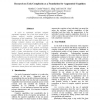Free Online Productivity Tools
i2Speak
i2Symbol
i2OCR
iTex2Img
iWeb2Print
iWeb2Shot
i2Type
iPdf2Split
iPdf2Merge
i2Bopomofo
i2Arabic
i2Style
i2Image
i2PDF
iLatex2Rtf
Sci2ools
HICSS
2003
IEEE
2003
IEEE
Research on Task Complexity as a Foundation for Augmented Cognition
In order to implement real-time adaptive augmented cognition, one of the focal points of our present research involves understanding the dimensions of task complexity. Task complexity is a construct that has been used in many fields such as biology, computer science, and psychology. An objective of our current research effort is to be able to instantaneously assess change in the cognitive capabilities of people as they perform increasingly complex tasks. In order to address these broader goals, a better understanding of task complexity is needed. Specific questions we ask include: (1) What are the factors that contribute to task complexity? (2) What are effective ways to assess task complexity? and (3) How can task complexity be reduced in real-time tasks? In order to address these questions, we review literature related to task complexity across several domains such as user models, human computer interaction, human factors and instructional design.
Adaptive Augmented Cognition | Biometrics | Current Research Effort | HICSS 2003 | System Sciences | Task Complexity |
Related Content
| Added | 04 Jul 2010 |
| Updated | 04 Jul 2010 |
| Type | Conference |
| Year | 2003 |
| Where | HICSS |
| Authors | Martha E. Crosby, Marie Iding, David N. Chin |
Comments (0)

